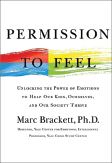 Permission to Feel: Unlocking the Power of Emotions to Help Our Kids, Ourselves, and Our Society Thrive
Permission to Feel: Unlocking the Power of Emotions to Help Our Kids, Ourselves, and Our Society Thrive
Explore This Issue
September 2021Marc Brackett, PhD
Celadon Books; Sept. 3, 2019
Julie Wei, MD, division chief of pediatric otolaryngology/audiology at Nemours Children’s Hospital and director of the Resident and Faculty Wellbeing Program at Nemours Children’s, is no stranger to self-care. As a member of the ENTtoday editorial advisory board and author of the “Wellness Rx” column, Dr. Wei believes that it’s critical to “choose positivity, laughter, patience, and forgiveness to experience a sense of calm, control, connectedness, kindness, and love.”
The two books she suggested as some of her current favorite reading material—Permission to Feel: Unlocking the Power of Emotions to Help Our Kids, Ourselves, and Our Society Thrive by Marc Brackett, PhD, and Self-Compassion: The Proven Power of Being Kind to Yourself by Kristin Neff, PhD—both focus on the importance of making time to care for ourselves. She loves them because of their potential impact on optimism, self-care, and medical, geographical, and spiritual communities.
ENTT: What made you choose these two books? Were they recommended to you by someone?
JW: I believe in telling yourself that you love who you are and offering yourself the same kindness and compassion you would to others. As someone who’s passionate about burnout and well-being, especially for surgeons, I think both of these books are critical.
I recently finished Permission to Feel: Unlocking the Power of Emotions to Help Our Kids, Ourselves, and Our Society Thrive by Marc Brackett, PhD—he’s the founder and director of the Yale Center for Emotional Intelligence with 25 years as an emotion scientist. Dr. Brackett was one of the keynote speakers for the American Society of Preventive Oncology virtual meeting this year. He gave the most incredibly compelling presentation on why it’s critical we learn emotional vocabulary and we teach it to others. His blueprint for understanding emotions has been adopted by thousands of schools.
Currently, I’m reading Self Compassion: The Proven Power of Being Kind to Yourself, by Kristen Neff, PhD, on how our harsh inner voice really doesn’t serve us.
ENTT: How often do you read books about being kind to yourself?
JW: Usually I’m a very slow reader—and, of course, I’m usually so busy I rarely have time I read—but I finished Permission to Feel in three days. For Self-Compassion, I read two to four pages daily, so I’m not quite done with it. I also read each short chapter repeatedly as a daily reminder to be compassionate to myself.
ENTT: Why do you feel these types of books are important for physicians to read and to use in their practices?
JW: I know that managing my own reactivity, frustrations, and impatience with others has been a critical part of dealing with all of the troubles, personal and professional, that have come out of the pandemic. Speaking positively to yourself can have immediate calming and wellness benefits for both you and others, and these books can help with that process.
The reason I loved Permission to Feel is that Dr. Brackett teaches us to stop judging our emotions and develop self-awareness through what he calls “RULER skills”:
R= recognition of our emotions
U= understanding why and source of emotion
L= labeling with accurate emotion vocabulary
E= expressing our emotions
R= regulating in healthy way
In his book, Dr. Brackett teaches us to stop judging our emotions and develop self-awareness. His RULER system uses science, passion, and inspiration—I was so impressed that I bought 30 copies to share with every member of our hospital medical staff health and health and wellness committee.
Self-Compassion offers expert advice on how to limit self-criticism and offset its negative effects, enabling you to achieve your highest potential and lead a more contented, fulfilled life. There are exercises and action plans for dealing with emotional struggles in all areas of everyday life, and the emphasis is on self-compassion rather than self-esteem.